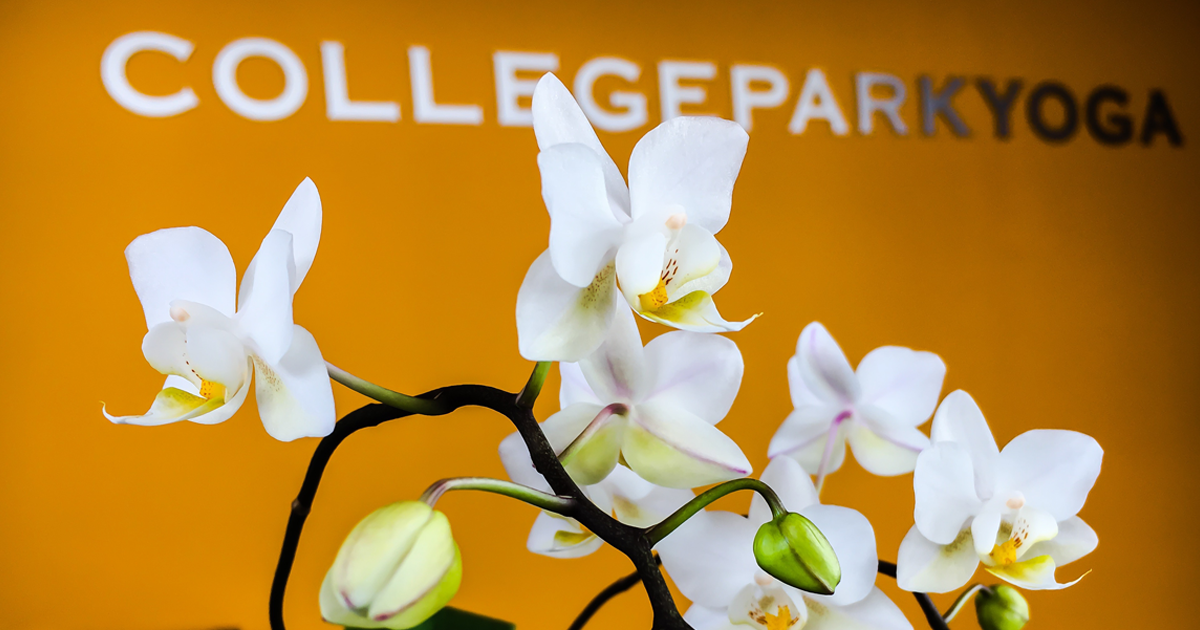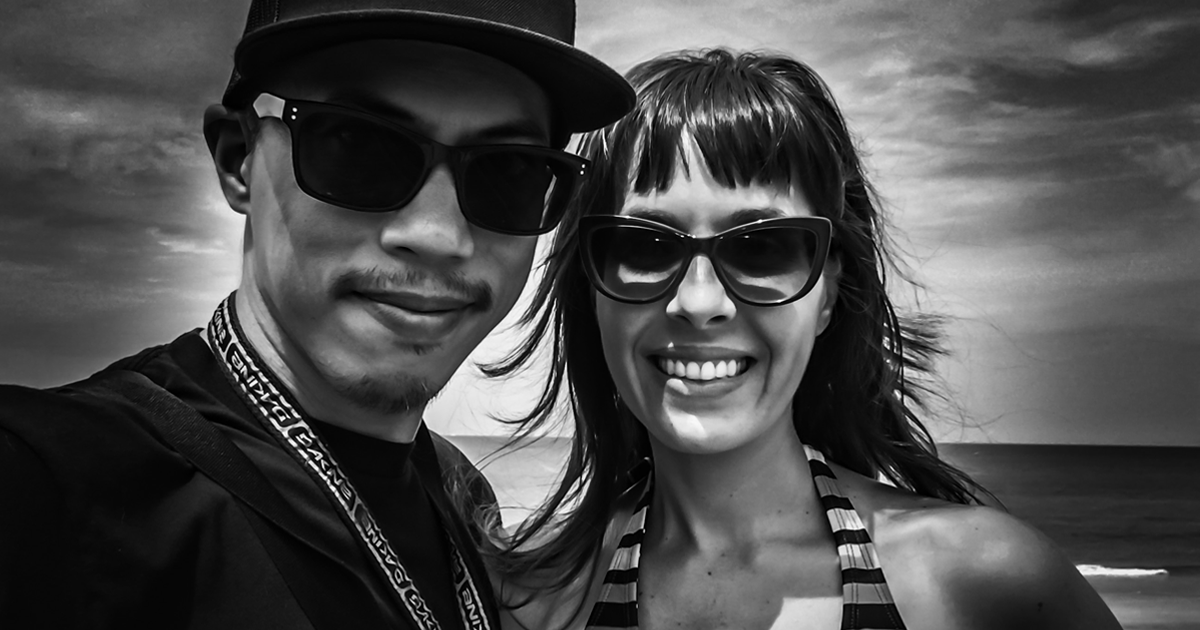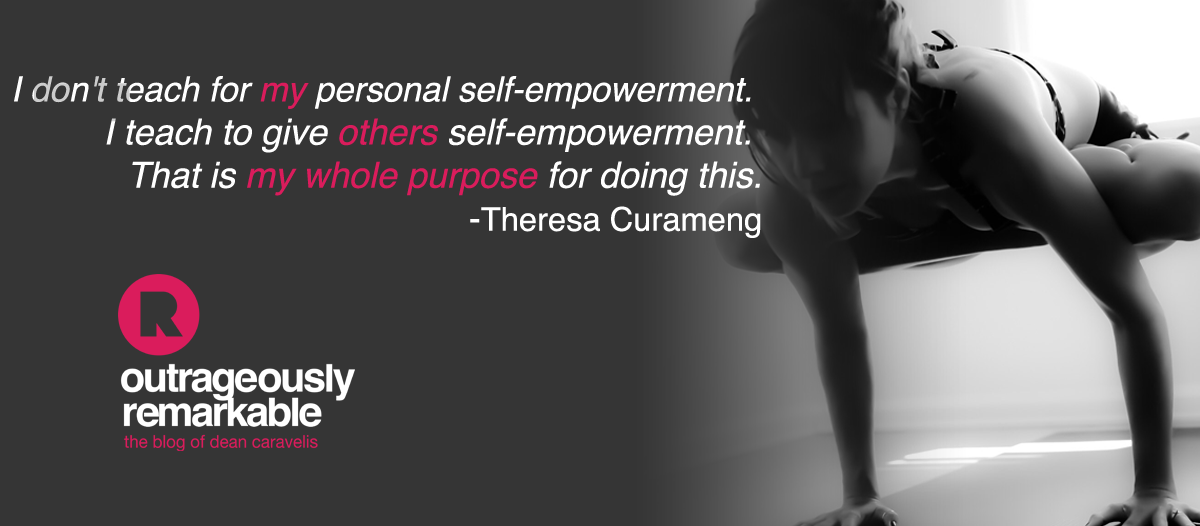It’s 8:09pm at night and Theresa & Calvin Curameng are standing outside the front doors of College Park Yoga (CPY) enthusiastically sending off every single person who attended their last class of the day. They somehow carried that energy from the opening greeting which was chock-full of smiles, laughter & hugs, and continued it throughout the entire sweat-drenched 90-minute yoga practice. I’ve personally witnessed this energy and enthusiasm firsthand over the last 4 years because I turned to CPY as a last ditch effort to solve lower back pain issues. By the way, once I began practicing yoga weekly, and sitting on an exercise ball at work every day, my severe lower back pain issues disappeared completely. If you’re sitting there reading this with this type of pain, this is your sign!
CPY exudes positive energy and Theresa & Calvin’s focus on customer service inspires me because it is not an aberration. It is consistently there without fail. They show up with it, they carry it and finish with it. Oh, and they’ve been at it for 16 years.
Sixteen years!
Seriously, that’s a long time. There are not many people I know that can focus on one project for that sort of duration and sustain their energy + enthusiasm! It’s easy to ‘bring it’ during your initial sprint, but it takes a prolonged commitment to still show it well after a decade.
I really wanted to learn more about what it takes to maintain this positive disposition even in the face of the grind & recently had the chance to sit with Theresa …
[Setting: CPY is close to Blezoo, so I was able to come by midday on a Friday to meet with Theresa. My colleague Angela came to snap a couple of pictures of the interview & Calvin was there to shoot video of the interview as well. We grabbed a seat on a couch, caught up for a minute & then started recording…]

Dean: Theresa, you and [your husband] Calvin founded College Park Yoga (CPY) in 2001. Wow, what a run. I usually ask people about how they fight the status quo, but in this case, I was wondering whether the status quo is a good thing in order to preserve the consistency and tradition of it?
Theresa: Definitely, it’s an ancient practice so with an ancient practice, there’s no need to change it, make it different, make it better. You just keep going on the path of consistency, dedication, devotion … those are things that are timeless and that is exactly how we run our business. We run it from that timeless space rather than trying to keep up with what everyone’s doing. We just keep doing what we’ve been doing.
Dean: Since you started in 2001, would you say that the demographic of the students has changed significantly?
Theresa: No, it hasn’t. Since we started, we’ve had students here who are 5 years old to 93 [years old], and that hasn’t changed. We serve everybody. And I think that’s because everybody feels welcome here. There are very few people that are unwilling to try a modification for a posture. Once they realize that a teacher is willing to work with where they are, you’re welcoming everybody in here. Our demographic is all levels and all ages.
Dean: Is there anything that has helped influence you in being a better business owner?
Theresa: Actually, it’s customer feedback. That has reshaped a lot of aspects of how I run my business. The constructive, negative feedback has been extremely instrumental in changing how I look at running a business. That has changed my life. I do suggest to other business owners when they do see something or hear something that someone has said about their place or their facility … look at the constructive side of that comment, not the negative part of it, and see if maybe there is something that you can change. It really does help you become a better business that can be better for all kinds of people and you can actually satisfy those people who may not have been satisfied five years ago. Making changes and listening to the constructive criticism really does change your entire ability to run your business.
Dean: How do you personally discern when something is constructive?
Theresa: When it’s not as emotional. When you put the emotion aside, there are some things that people are saying and when you hear that, you go okay. The ones that are emotional and they keep going on and on, you just have to dump those, but the ones that are like, you know, something had happened, or there was a situation that had occurred, and you realized when you look back on it that you could have altered how you responded to something like that. There are some things that a business cannot change that people will comment on, but the things we can change, I will definitely do my best to accommodate that. Absolutely.

Dean: Are there any tips, or tricks, or bits of knowledge you can share with my readers about what it takes to stay in business this long and continue to be enthusiastic and energetic about things?
Theresa: It really is a practice of perseverance and also, it’s the practice of not constantly looking for, “What can I do next?” I think too many people focus too much on what’s next that they neglect the daily duties. The space starts falling apart that way. For Calvin and I, I think it’s more to sustain yourself for 16 years, you need to make sure that you take care of everything for 16 years. You’re willing to do everything … all parts of the business … because you might have someone today that’s going to help you, but they might be gone next week. You have to be able to see that you can take that on, but only if you take something else away. Instead of thinking about your next move, you need to instead ask, “How can I manage myself and stay sane and manage my business and stay sane?” You don’t want to lose the ‘what’s next’ energy, but don’t fall into the feeling that you’ve lost everything and everything is unwinding. That happens in small businesses all the time … the unwinding … and it gets so fast that you almost lose it. So, I think it’s really important to stay balanced between all the things that have to happen on a daily basis and not neglect the things that are necessary for your business to survive daily.
Dean: I’ve always been interested in if nonprofits view themselves as competitors because they’re fighting for a share of peoples’ money, you know? What’s the perspective of a yoga studio? Are other yoga studios complementary businesses that are helping to promote yoga or are they competition? How competitive is it?
… yoga practice also beholds a non-competitive nature
Theresa: Okay, when I started a yoga business, I was extraordinarily naive and your idea of complementary, everyone works together … we thought that’s what it was going to be like. The truth is it’s not that way. What we do is that we operate our business how we’re going to operate it, we teach our classes how we’re going to teach them, and we don’t look at other studios as competitors because once you start doing that, it gets bad behind the scenes and you’re not applying your practice anymore. The whole essence of yoga practice also beholds a non-competitive nature, so it doesn’t make sense to be operating a yoga studio, being competitive, but then turning around and teaching your class that night to be non-competitive. To me, it’s too flipped and it doesn’t promote what practice is really all about and I really don’t know if a person who does operate their studio competitively can really flip that quickly and then tell their students to be calm, peaceful, and tranquil. How is that possible if they’re not practicing it on the business end, too? So for us, it’s definitely a non-competitive endeavor. We can’t worry about others, at all. We honestly don’t and it’s kind of nice.

Dean: If you could send an email back in time to yourself, to 2001 [when you founded the business], what would that email say?
I take days off from dealing with salespeople
Theresa: It would say don’t worry about working seven days a week. You’re going to be working seven days a week forever because you practice yoga and practice is seven days a week. Your diet is seven days a week. Your lifestyle is seven days a week. I don’t get to take a break from anything that I do because of what I do for a living. So, why do I need to worry about taking a day off? It used to be something that … I guess society implants it into our minds. We need to have weekends, we need to have time off, and even our students will tell us to take days off. Personally, when it comes to teaching and it comes to running the business, I take days off from social media, I take days off from emails and telephone calls, I take days off from dealing with salespeople, but I don’t need to take a day off from teaching. For us, being here seven days a week is just part of our practice of dedication, and perseverance, and devotion.
Dean: Seven days a week, you and Calvin are still here. How do you make it work here? Do you guys have specific roles that you have? Or do you kind of do things 50/50?
Theresa: We are a complete team. We realized that separately, we got things done, but together we get more accomplished and are better. For us, we carry 50/50 of everything. Whether it’s cleaning the studio, or deciding how it’s going to operate, or how classes are taught and led … it’s all 50/50. There is no imbalance or one person who is better at the front or the back. We try to balance each other out perfectly. So he might have a weakness, which he has very few, but I’ll come and balance that out and he would do the same for me. Our students respond to that in a very positive way.

Dean: What’s the biggest business challenge you’ve had to deal with in the last 16 years? I’m sure that there are many, but when I ask that, what’s the first thing that pops into your mind?
It was a 10-month process, 22 hours a day, seven days a week
Theresa: The first thing that pops into my head is moving here … into this space. It was a 10-month process, 22 hours a day, seven days a week to move in here. It was one of the greatest challenges for my practice because I was really going to a point of wow, I am really taxing myself on all levels … physical, emotional, mental, everything. So, the only way we could get through something like that was to keep our practice up and to also be mindful of what we were fueling ourselves with. When you work like that, you tend to want to fuel yourself with unnatural stimulants and things like that … like coffee and sugar. That was the biggest challenge for us because it was almost a year.
Dean: So were you doing double duty, running the practice over there while you had the expenses of the build-out over here [at the new place]?
Theresa: Yeah, everything was happening simultaneously, so there was a lot of very big challenges that we had to face in that year … that we weren’t necessarily planning on experiencing.
Dean: What would you say is the biggest upside of getting through that move into this space?
Theresa: Just being in here! I love this space, the landlords love this space, which is remarkable because I’ve never been in a building where a landlord cares as much about the well-being and maintenance of the building as the landlords here. We’re very grateful to have that experience because it makes what we do so much easier. We can’t have a leaky building. We’ve been in leaky buildings and it was bad. We had to replace the hardwood floors in our last space like seven times. I haven’t had to replace our hardwood floors here once. Being in here has just been the biggest upswing to that entire traumatic experience of moving. Also, our students love it because we never have to turn them away. At our old space, we were always turning people away and we were feeling terrible because they’d spent the whole day planning on being there and then all of a sudden, they couldn’t come to class. I hated doing that to people so I wanted to make sure that that experience would never happen again. That’s why we made sure the room was large enough for a lot of kids.
Dean: It’s interesting, too, because every business has vendor relationships, but in the service you provide, I think that the landlord is the most important vendor relationship.
Theresa: Absolutely.
“Please, don’t even try to push that button …”
Dean: It’s no secret that you and Calvin are always smiling or laughing, that’s like the soundtrack of this place … I love smiling, too, but I also know how difficult it is to run a business. How do you maintain a positive mindset day in and day out, seemingly all the time?
Theresa: Naturally, I have always been this way. Lighthearted, bubbly … my mom will sometimes joke that I came out of the womb laughing if that’s any help to the kind of person I am. It’s natural, but practice enhances it. Yoga practice made it even stronger and it even makes the lows a lot less frequent and that is what has helped me maintain my positive disposition, I guess you could call it.
Dean: Conversely, what does Theresa getting mad look like? I get the vibe that you’re fiery …
Theresa: You don’t want to see it. I tell people, “Please, don’t even try to push that button because it’s not good and it means that you’ve done something really bad. You don’t want to be that person who Theresa finally realized has done something bad because that means you’ve hurt a lot of people.” When it hurts more than just me, I don’t have a very nice tongue.
Dean: Is there something that you can share with me that is absolutely 100% true about you, but that most people would not believe?
Theresa: One thing that every new student will do is that for the first 15 classes, they look at me going, “There is no way this girl is this happy to see me and this happy that I’m here. There is no possible way. She says that to everybody. There’s no way that’s for me.” And what they don’t realize is that when I’m sitting behind that desk, I’m honestly, in my heart and soul, through and through, happy to see those people walk through the door. Students don’t realize that until they’ve been with us for a long time and they go, wow, she really is happy to see me and she really does care that I’m walking in the door. I think a lot of people take bubbly personalities as fake so a lot of people have to go through a thing to realize that my bubblyiness isn’t fake; I was born this way. There is no way that I am ever unhappy to see them. I am always so thrilled to see our students. And that is definitely 100% honest.

Dean: Let’s pretend that we’re in an alternate universe. If you never came in touch with yoga, what would you be doing professionally?
Theresa: Well, this is interesting because I was going to school to be a teacher anyway. Teaching was always natural to me. All my jobs that I’ve had, most of the people would move me into the position of being a trainer because I loved communicating whatever needed to get done to other people and helping people develop in whatever small way possible. So I think that no matter what I would be doing, I would be teaching something of interest to me, definitely.
Dean: When you were in school, what did you want to teach?
I wanted to go to the toughest group …
Theresa: I was going to school to be a high school teacher for English and creative writing because I had teachers in my history that got me through some very challenging times in high school. If I didn’t have them, I really don’t know what would have become of me. They really helped me a lot so I wanted to be that for other people, so I wanted to go to the toughest group. I wanted to go to the high school kids.
Dean: Well if you ever change your mind about yoga, we need you!
Theresa: I find that high school kids come here now, which is really phenomenal. We’ve had quite a few over the last 10 years. We’ve actually watched them grow up and there’s this whole new run because yoga is becoming more mainstream. High school kids are finding us and once they meet us, they have high school issues … big ones … and we’re able to help them get through a lot of things, so it’s a pleasure to still be able to do that.

Dean: Who has been a mentor to you that has greatly influenced you? And how?
Theresa: A lot of people might look at this and go, “Oh my gosh, here she goes,” but Calvin has been my teacher forever. He’s the one who got me into yoga and I’ve always looked to him to help get me through situations and things. He gives me a different way of looking at things. He’s always been really good at helping shift perspectives and he’s been an awesome teacher for me both as a yoga teacher, but also as running a business together. He’s taught me a lot of things about myself and he’s one of the few people in the world who can look at me honestly and say, “Let’s work on this.” I absolutely love that because a lot of mentors I’ve had, there was always a little bit of, “Oh, we shouldn’t go there. We don’t want to talk about that.” Calvin will talk about that, he does want me to change and become a better person, to become the best that I can be. That’s where I think that having a mentor like that has been really powerful. It’s part of the reason why I’m where I am today. Otherwise, I might still be at a taco shop [where me & Calvin first met when we worked together]. [laughs]
Dean: Besides, Calvin, who is the most remarkable person you’ve ever met and why?
I’ve been fascinated by her …
Theresa: My mom. She is a really awesome yoga practitioner. She has gentleness and kindness mastered so much greater than most human beings, even people who do practice yoga. The kindness and gentleness that comes from her is powerful. The way that she lives her life … ever since I was a kid, I’ve been fascinated by her … she really beholds what I think being a good person is and being a good practitioner is. You don’t see that in a lot of people, so, my mom has been a huge influence in how I make day-to-day decisions.
Dean: Did you get her into yoga?
Theresa: No, she’s not into yoga at all, but she practices all aspects non-physical. She has a beautiful spiritual practice, she has a beautiful human practice, she cares about other people so immensely. She has every quality that I wish that I would see in more yoga practitioners today.
Dean: It’s interesting when you say “non-physical” because, in this context, you’re referring to yoga as a holistic 360 attitude or lifestyle when most people think of yoga as poses?
Theresa: Oh yeah, always!
Dean: OK, putting your humility aside and digging a bit deep to be open, what is your secret to being outrageously remarkable?
Theresa: That I don’t teach for my personal self-empowerment. I teach to give others self-empowerment. That is my whole purpose for doing this. I don’t do it for myself. I do it for others, absolutely 100%.
Thank you, Theresa! Your good vibes are infectious.
__
Connect with CPY on Facebook or their Website !
ALSO, don’t miss out! Sign up here to be an Outrageously Remarkable Insider & receive e-mails when new interviews are released.
…and thanks so much for clicking on the social share buttons at the top. Grateful for you joining us today!
